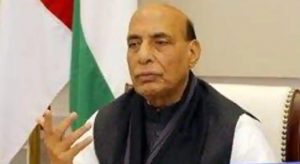India has stood up to China’s “unprovoked aggression” on the Line of Actual Control (LAC) and fought the People’s Liberation Army (PLA) and forced its troops to go back, though Beijing’s assertion of power is creating uncertainty across the region, defence minister Rajnath Singh said on Monday.
In unusually blunt remarks while addressing the annual convention of the Federation of Indian Chambers of Commerce and Industry (FICCI), Singh said India is at a point in its history when it needs to stand up for itself and make it known that the country “can fight anyone” and take on any challenge to survive.

Singh called on industry to step up to forge partnerships to provide the armed forces with the right technology and equipment for defending the country and also for driving the export of military hardware.
“The unprovoked aggression on our Himalayan frontiers is a reminder of how the world is changing, how existing agreements are being challenged, how power is being asserted not just in the Himalayas but across the Indo-Pacific, and how uncertain the future of the region and world could be in this backdrop,” he said during the online event.
“As you are aware, there is a big build-up of armed forces at the LAC in Ladakh.
In these testing times, our forces have shown exemplary courage and remarkable fortitude. They fought the PLA with utmost bravery and forced them to go back,” he added.
The standoff between Indian and Chinese forces in Ladakh sector of the LAC is currently in its eighth month, and tens of thousands of troops from both sides have dug in for the winter after several rounds of military and diplomatic talks failed to make headway on disengagement and de-escalation at key friction points.
Singh said: “There comes a point in a nation’s history, every now and then, when it needs to stand up for itself, tell that India can fight anyone, that it’s capable of taking any challenge, just to survive.”
He further said coming generations will be proud of what the armed forces have managed to achieve this year. Pointing to the debate regarding the comparative military strengths of the two countries, he contended there was “no scope of ambiguity” that India is far ahead of China in leading the world with ideas and soft power.
“Whenever there is a situation at the LAC, the most obvious outcome is a comparison between India and China’s military strength. There can be a serious debate on who owns more military might but when it comes to soft power there is no scope of ambiguity,” he said.
Buddhism, he said, had a “monumental influence over China, to an extent that before the 1949 revolution, almost 80% of China’s population followed Buddhism”. Singh also quoted a Chinese scholar who had said that India “has culturally dominated and controlled China for more than 2,000 years without sending a single soldier across the border”.
Singh also referred to the issue of terror emanating from Pakistan and said the world is only now acknowledging the issue though India grappled with it alone for years.
“We have been victims of cross-border terrorism, yet have fought the scourge alone even when there was no one to support us but later, they understood we were right about Pakistan being the fountainhead of terrorism,” he said.
Pointing to troops “in the forefront fighting icy winds to guard our borders”, Singh asked if the industry could stand shoulder-to-shoulder with the armed forces by using the country’s economic strength to its advantage and forging the right partnerships to provide the right technology and military products to the three services.
“We have opened doors to the private sector, incentivised domestic production, are creating defence corridors and doing a lot more. We are also willing to engage in meaningful joint ventures and partnerships with other countries,” he said, adding the industry should produce defence hardware in India for the world.